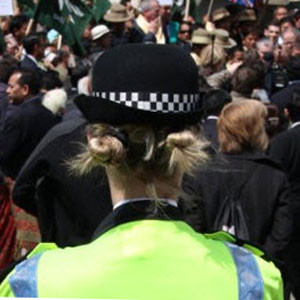“If only there was a defendable study which could identify barriers to promotion and strip away some persistent assumptions that work life balance is the only thing holding women back. Oh wait-I believe I am part of one at the moment-stay tuned.”
4th April 2013 –Courtesy of – Nic Brunetti – Police Oracle – A lack of senior female officers is a sign of persistent gender inequality in the new Scottish Police Service. PoliceOracle.com examines how the situation must change.
With more women than ever before in the Police Service, new female recruits could be forgiven for thinking that senior role models are easy to come by.
But with the single force in Scotland now a reality, female officers have been given a stark reminder of how far there is still to go in terms of gender equality.
The proportion of female officers in Scotland is almost identical to that in England and Wales at 28 per cent. However, look a little deeper and you find that just 9 per cent are chief officers – for every 11 ACPOS-level officers in Scotland, only one is a woman.
This compares poorly with the service in England and Wales, where women make up 17 per cent of all ACPO officers. But even here there is clear room for improvement.
And it’s not as if women are waiting in their droves to burst through the superintending ranks to these higher echelons.
Out of the 50 chief superintendent roles in Scotland, nine are female (18 per cent). Two of them will hold local commander positions compared to 12 of their male colleagues.
Meanwhile, just over 12 per cent of 134 superintendent roles in the new force will be held by women.
Work-Life Balance
The need of many women to balance other pressures and commitments at home must be accommodated rather than rejected, says Supt Gavin Buist, Vice-President of the Association of Scottish Police Superintendents (ASPS).
“I think the service has to mature a little and realise there are some systematic elements which are discouraging women from moving forward,” said Supt Buist, who is also the chairman for Equality and Diversity at ASPS.
“The family argument is still legitimate up to a point – they still bear a lot of responsibilities for childcare.
“People will also find they have to care for elderly relatives at an age where they might expect to become sergeants, inspectors or chief inspectors. These are the ranks that start to attract 24/7 shift working and that creates a tension for some women as they try to find that work balance.”
Supt Buist said part-time and flexible working could be embraced by more managers.
“Part-time working is a legitimate contribution to policing as much as it is in any other industry. Just because someone opts for a flexible working approach doesn’t mean they shouldn’t be considered for higher ranks.
“We need to recognise that there perhaps have to be alternative career paths alongside traditional routes.”
His sentiments are supported by the Chair of the Scottish Women’s Development Forum, Angela Wilson, who until recently was the temporary chief constable of Tayside Police. She has reverted to a chief superintendent role in the new Police Scotland.
Ms Wilson said part-time and flexible working were a way forward, but not the only answers.
“We have to make sure we allow women to combine a career and a caring facility which fits in with the force as well,” she said.
“Many part-time workers are the most committed, they have the lowest sickness rates and they work flat-out for the time they are in the workplace.”
She said the forum would be urging line managers in Police Scotland to change their approaches towards women in its first year – and the way they think about staffing and rotas.
“It is about getting across to line managers that this is a fact of life – there are more women – you have to be creative and think of how you can turn that into an advantage, rather than a disadvantage.”
The forum is celebrating its 10th anniversary this year and Ms Wilson said the proportion of women in Scottish policing had only been 18 per cent a decade ago.
“Now we have seen a rise, but the vast majority of that rise are women still in very junior positions,” she said.
“The forum helped ACPOS introduce flexible and part-time working and career breaks, which has retained women, but we haven’t retained enough to see them at a sufficient level in the senior ranks.
“Scottish women, more so than women in England and Wales, sometimes suffer from a lack of belief in themselves. They don’t believe in themselves until they are maybe three-times better than their male colleagues.
“There is a belief that ‘if I have children, I can’t do that’ [proceed to a higher rank].
“We are building the mindset that ‘I am as good as, if not better than, my male colleagues’.”
England And Wales Sitrep
England and Wales are hardly doing much better than their Scottish counterparts in the superintending ranks.
Currently there are 155 female superintendents from a total of 959 (16 per cent) and 50 chief female superintendents from a total of 414 (12 per cent).
British Association for Women in Policing (BAWP) Secretary Carolyn Williamson said there remained issues with the way the Police Service dealt with flexible working. “People are finding it very difficult to either get it in the first place or maintain the agreement they already have,” the former West Midlands Police sergeant said.
“It does disproportionately affect women.
“There is a view that we are recruiting more women into the service, but more are leaving. They are finding it a lot more difficult to stay, from a working practices point of view.”
The government is currently carrying out a consultation over direct entry programmes that would allow external candidates to enter the service at superintendent or inspector rank. Candidates could come from a broad range of backgrounds and anyone selected would have to face fast-track training.
Miss Williamson said BAWP did not believe this would necessarily increase female numbers in the senior ranks.
“It is more about senior police officers having experience on the ground, which obviously they [external candidates] wouldn’t have,” she said.
The proposal could create two problems for external female candidates, said Lancashire Constabulary Chief Superintendent Irene Curtis, who is also the first full-time female president of the Superintendents’ Association of England and Wales. This would make it unlikely for them to stay in policing, even if they had been selected.
“First of all, they have a credibility issue of not being an experienced officer,” she said.
“Secondly, they are coming into a culture which generally doesn’t value people who are different and have different perspectives.
“Unless there is a cultural change, I don’t think it will make a difference.”
Ch Supt Curtis said she believed the service still did not fully value women and that this was linked to preconceived ideas about driving performance culture from the senior ranks.
“There is a culture within the service whereby people who think differently are not necessarily supported,” she added.
“There is a link to performance culture that, to drive performance, you have to have a ‘hard edge’ and it tends to be men who have the ‘hard edge’.
“So when women have a different leadership style they are not always looked upon as a valid leader.”
Future Optimism
Police Scotland Deputy Chief Constable Neil Richardson said barriers were coming down for women but “we have still got work to do”.
“We will make more effort to assist females to get into senior and specialist roles,” he said.
“More women than ever are joining the service as probationers. They will play their part in the new service and will be the leaders of tomorrow.”
Exactly when tomorrow will be is yet to be seen. But unless there is a cohesive effort across the service, women breaking into the upper echelons on a regular basis is likely to a prolonged journey. Different types of working must be truly embraced, and resentment against women for not adhering to the common shift pattern must be dispelled. However, there will still be many women who are completely happy to work in exactly the same way as their male colleagues – and this must also be recognised.
Or as ACPO Women’s Forum lead Assistant Chief Constable Katherine Govier said: “We need to get to a stage where being a woman in the service doesn’t make you feel different.”


